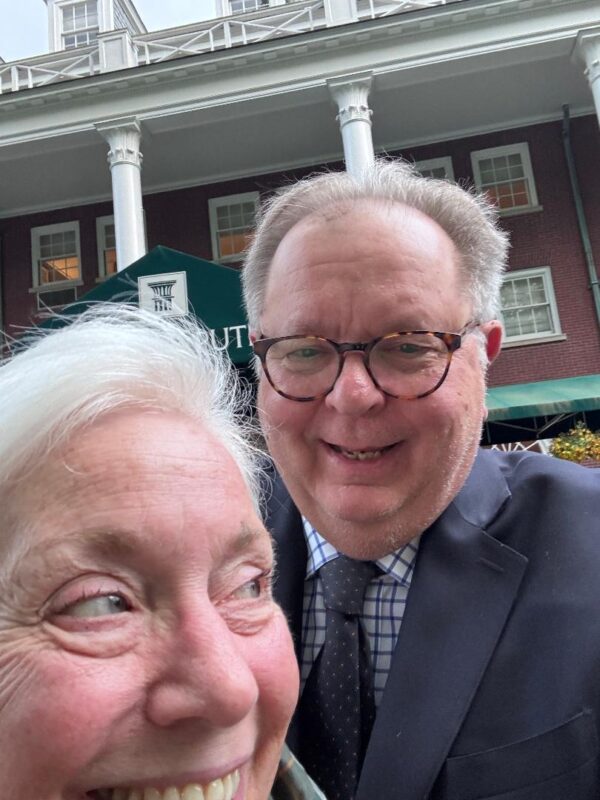5.30 Loretta Swit dies at 87.
5.28 Gautam Mukunda in Bloomberg: “Imagine if China or Russia tried to destroy a US asset that generates tens or even hundreds of billions of dollars of economic value, plays a major role in American leadership in science and technology and turbocharges our prestige and soft power. We’d expect our government to go to war to defend it. But in attacking Harvard University, that’s exactly the kind of damage the Trump administration is trying to do. Despite the school’s failures and flaws, it remains a vital national asset — and the administration’s actions are far more dangerous to America than they are to Harvard.”
5.28 CNN: “There’s a new type of trade taking hold: TACO, short for Trump Always Chickens Out. In other words, don’t fret too much about Trump’s latest tariff threat and go on a selling spree, because eventually he’ll back down and a relief rally will ensue. Trump said he first learned of the term, coined by Financial Times commentator Robert Armstrong, when a reporter sought his reaction. “I chicken out? Oh, I’ve never heard that. You mean because I reduced China from 145% that I set down to 100 and then to another number? . . .Don’t ever say what you said. That’s a nasty question. To me, that’s the nastiest question.”
5.28 Elon Musk says he is ending his government work to spend more time on his companies. Musk also made it clear that he is disillusioned with Washington and frustrated with the obstacles he encountered as he upended the federal bureaucracy. Musk, who once called himself Trump’s “first buddy,” is now operating with some distance from Trump, raising questions about the strength of their relationship. Musk says Trump’s signature domestic policy legislation would add to the national deficit, complained about a lucrative deal to build an AI data center in the Middle East that went to a rival company, and has yet to make good on a $100 million pledge to Trump’s political operation.
5.28 The U.S. Court of International Trade says Trump overstepped his authority in imposing his “reciprocal” tariffs globally, as well as levies on Canada and Mexico.
5.28 David Frum in The Atlantic: “During his first presidency, Donald Trump collected millions of dollars of other people’s money. He charged the taxpayer nearly $2 million to protect him during the hundreds of times he visited his own properties. He accepted millions of dollars of campaign-related funds from Republican candidates who sought his favor. His businesses collected at least $13 million from foreign governments over his first term in office. When it was all over, Trump apparently decided he had been thinking too small. In his first term, he made improper millions. In his second term, he is reaching for billions: a $2 billion investment by a United Arab Emirates state-owned enterprise in the Binance crypto exchange using the Trump family’s stablecoin asset. An unknown number of billions placed by Qatar in a Trump-family real-estate development in that emirate, topped by the gift of a 747 luxury jet for the president’s personal use in office and afterward. Government-approved support for a Trump golf course in Vietnam while its leaders were negotiating with the United States for relief from Trump tariffs. Last week, Trump hosted more than 200 purchasers of his meme coin, many of them apparently foreign nationals, for a private dinner, with no disclosure of the names of those who had paid into his pocket for access to the president’s time and favor. The record of Trump real-estate and business projects is one of almost unbroken failure; from 1991 to 2009, his companies filed for bankruptcy six times. Few if any legitimate investors entrusted their money to Trump’s businesses when he was out of office. But since his return to the White House, Trump has been inundated with cash from Middle Eastern governments. Obscure Chinese firms are suddenly buying millions of dollars’ worth of Trump meme coins. So are American companies hard-hit by the Trump tariffs and desperately seeking access and influence. After Trump invited major holders of his crypto funds to dinner, Wired quoted a crypto analyst about the coin’s value proposition: “Before, you were speculating on a TRUMP coin with no utility. Now you’re speculating on future access to Trump. That has to be worth a bit more money.” Nothing like this has been attempted or even imagined in the history of the American presidency. Throw away the history books; discard feeble comparisons to scandals of the past. . . .The brazenness of the self-enrichment resembles nothing seen in any earlier White House. This is American corruption on the scale of a post-Soviet republic or a postcolonial African dictatorship.”
5.26 Charles Rangel dies at 94.
5.25 Mission Impossible Final Reckoning Part 2. I give it a B.
5.24 Our 50th anniversary. Dinner at the Gideon Putnam Inn in Saratoga Springs.
5.24 Fintan O’Toole in NYRB: “Trump personifies American capitalism. He performed in fourteen seasons of The Apprentice as a figure deeply embedded in its mindset—the magnate, the mogul, the tycoon, the titan of commerce. His act was, of course, more impersonation than personification. But this made it all the more effective: for mass consumption, an invented and exaggerated character sends a clearer signal than a real person. No less importantly, Trump allows his fans to take possession (albeit in phony forms) of all the feelings that they were not supposed to express or indulge while their world was being taken from them. He presses hard on the raw nerve that Vance was so careful to avoid in Hillbilly Elegy: exploitation. In the neoliberal order, it was the vice that dared not speak its name. In his economic discourse, Trump speaks no other language. But he also displaces exploitation from economic reality—instead of labor being taken advantage of by capital, America as a whole is continually abused and despoiled by foreign countries that laugh at the weakness of its leaders. Instead of moving on, as the steelworkers of Middletown had to do when they accepted their former Japanese enemies as saviors, there can be endless return to grievance, humiliation, and outrage. In place of forced amnesia, Trump offers a seductive dream time in which American history is sanitized into nostalgia. (The dark sides of the pre-Reagan industrial past are either suppressed—in the case of racism—or, in the case of its organized sexism, effectively celebrated as a golden age of manliness.) For the superrich, this personalization of capitalism has two superficial upsides. One is that it seems to provide some kind of answer to the knotty question of what comes after the fall of the neoliberal order. The working class can be given the political agency it was previously denied; its pent-up emotions are unleashed and turned against all those who insist on a regulated and redistributive form of capitalism. The other is that it appears much easier to deal with political power when the complexity of democracy is reduced to a single individual. These delusions are possible only because so many of the rich believe their own propaganda. As Gary Gerstle puts it, “Cultivating ‘entrepreneurs’ of the self has long been a cardinal feature of the neoliberal order, and it shows no sign of waning” in the continuing half-life of that era. The tech oligarchs who facilitated Trump’s second coming know very well that he is a fake tycoon. But they can see and admire his astounding abilities as an entrepreneur of the self. He is not just an exploiter of social media technologies—he is one of the great exemplars of their governing ethic of endless self-invention. The built-in flaw of this cult of the self-made man is that it leads those who have created vast fortunes to believe that they did it all themselves. They are subject to the same amnesia that neoliberalism demanded of the working class. They lose touch with all the things that made liberal democracy so essential to the development of capitalism: the rule of law; the relative stability that comes from allowing different sections of society to feel they have a share of power; public investment in education, health care, and science; the creation and maintenance of physical and digital infrastructures; predictable government informed by an expert bureaucracy. They build their own rockets and go into orbit far above the social and political conditions that have made their wealth possible.”
5.24 Fintan O’Toole in NYRB: “Adjusted for inflation, the wealth held by families in the United States almost quadrupled between 1989 and 2022, but the share of it held by the bottom half of the population remained static at just 6 percent. Last year alone the nineteen richest households added $1 trillion to their accumulated assets, and the top 0.00001 percent now control a larger share of America’s wealth than ever before. The story Vance told in 2016 was a very good one for the richest Americans: it suited their purposes that the Middletown folk should understand capitalism as essentially impersonal and apolitical and accept that the best they could do was to “make things better” for themselves without blaming either government or “faceless companies” for their struggles. Now, however, the vice-president has ditched, along with most of his other political positions, his moral tale of realistic adaptation to the relentless change inherent in capitalism. It has been replaced by the president’s fable of a politically driven restoration of the past. Trump’s economic agenda is doubly recursive: it repeats almost exactly his messaging from the 1980s, which in turn imagines a recovery of the heroic age of American industrial might. The end of history has ended. Trump has built an imaginary time machine in which “the way it used to be” is also the way it must and will be. And in this radical revision of the ideology of American capitalism, Fukuyama’s “universalization of Western liberal democracy as the final form of human government” is not merely obsolete; it must be confronted. Universalism, liberalism, and democracy are the enemies of American exceptionalism, of national greatness, and above all of the triumph of the will that must be embodied in the leader who declares, “I alone can fix it.” As it happens, this replacement of one hegemonic idea with another is now playing out in a particularly ironic way in Middletown itself. In Hillbilly Elegy the steel plant is saved because Kawasaki comes in to “retool” its machinery. But more recently another kind of retooling was envisaged. Cleveland-Cliffs, the company that owns the plant now, declares on its website an intention to shift “away from manufacturing commodity steel in favor of higher-margin, specialty products.” To this end the Biden administration had allotted a $500 million grant to help the Middletown plant upgrade its aging blast furnaces, powered by coal, to ones fueled by hydrogen and electricity. But according to CNN the Trump–Vance administration—under the influence of Elon Musk’s Department of Government Efficiency—intends to ax that grant. This is OK because adaptation to economic change is out and political will is in. The future does not have to be planned for or funded because the past is returning. The Middletown plant does not need to shift to the production of high-value sustainable steel because Trump will use tariffs to ensure that it does not have to compete with cutting-edge global companies. King Coal will reign again, and the good old dirty jobs will be filled by men doing men’s work, all thanks to the great leader who made the foreigners bend the knee. Leaving aside for the moment the viability of this new way of imagining American capitalism, we must ask why most of the oligarchy thought, when it swung behind Trump’s bid for reelection in 2024, that it could do without the old ideological model. The myth of a depoliticized and impersonal economy, in which essentially the same assumptions would apply whether the president was a Clinton or a Bush, served the superrich extremely well. Not only was wealth redistributed upward, but new forms of lucrative exploitation—the appropriation on a staggering scale of personal data for private profit—were allowed to flourish virtually unimpeded. Information technology, too, was construed as an unstoppable force to which everyone would have to adapt. The problem for the very rich, however, is that as a political project neoliberalism hit the buffers in 2008. The great banking collapse exposed the idea that market forces operate outside politics as a convenient and no longer credible fiction. It became unavoidably obvious that the system of finance capitalism that replaced the old industrial complex is entirely dependent on public institutions. The moral basis for neoliberalism’s radically unequal distribution of the spoils of the new globalized economy had been a sense of rough justice: those who took the risks deserved the rewards. Yet it turned out that these were not the rules after all—the risks were socialized, but the rewards were privatized. For the rich, the bet had always been “heads I win, tails you lose.”’
5.23 Roge Karma in The Atlantic: “Rising interest rates might not be such a big issue if Trump’s policies were simultaneously supercharging America’s economic growth. Instead, almost every credible growth forecast this year has fallen significantly in response to those policies. With Trump proposing new tariffs seemingly at random—including, just this morning, a 50 percent tariff on the European Union and a 25 percent tariff on all imported Apple products—businesses face paralyzing levels of uncertainty, a fact will likely drag down growth even further. Meanwhile, congressional Republicans claim that the massive tax cuts promised in their budget reconciliation bill will spur an economic boom, but several independent analyses have found that they will hardly affect growth at all, let alone enough to overcome the negative impact of tariffs. In fact, many economists warn that the U.S. economy could be headed for something akin to 1970s-style stagflation. In normal times, the Federal Reserve could step in and mitigate both of these problems by cutting interest rates to boost growth or buying up Treasuries to quell financial-market panic. That is highly unlikely, however, when the central bank is also worried about the possibility that both the tax bill and Trump’s tariffs could set off an inflationary spiral. In the past week, multiple members of the Federal Reserve’s rate-setting body have signaled that it is unlikely to lower interest rates for the time being. This confluence of rising interest rates and slowing growth is the exact set of circumstances capable of turning America’s national debt into a genuine crisis. When r remains higher than g for a sustained period of time, a vicious cycle emerges. Rising debt-servicing costs force the government to borrow more money to make its payments; investors, in turn, demand even higher interest rates, which pushes debt-servicing costs even higher, and so on. In the best-case scenario, this process unfolds gradually, and the consequences are painful but not catastrophic. As more and more of the government budget is diverted to finance ever-growing debt-servicing costs, less room will be left to fund key social programs and productive investments; higher interest rates will mean less business investment and slower growth; and the government will be less capable of responding to a future economic crisis that requires heavy spending.
If, however, the debt snowball were to gather momentum quickly, the damage could be far worse. Investors might conclude that U.S. debt is no longer a safe investment, causing the equivalent of a bank run on the Treasury market as investors rush to sell their bonds for cash. Once that kind of psychological panic sets in, anything can happen.”
5.23 In May, according to Opta Stats, the Yankees’ Jasson Dominguez–known as The Martian–hit three homers in a game, homered from both sides of the plate in a game, hit a grand slam home run, and all walk off home run. He is the first player in MLB history to accomplish all of those feats in a single month.
5.22 During the night, the Republican-led house advanced by a 215-214 vote“a massive piece of legislation”–Trump‘s “big, beautiful bill”–that pairs pair huge cuts to food assistance and health insurance for low-income Americans with even larger tax cuts for affluent ones, “that might, if enacted, carry out the largest upward transfer of wealth in American history.” Jonathan Chiat in The Atlantic: “Hakeem Jeffries, the House minority leader, warned that the bill’s passage would mark the moment the Republicans ensured the loss of their majority in the midterm elections. That may be so. But the Republicans have not pursued this bill for political reasons. They are employing a majority that they suspect is temporary to enact deep changes to the social compact. . . .The House cemented the bill’s majority support with a series of last-minute changes whose effects have not been digested. The Congressional Budget Office has not even had time to calculate how many millions of Americans would lose health insurance, nor by how many trillions of dollars the deficit would increase. The heedlessness of the process is an indication of its underlying fanaticism. The members of the Republican majority are behaving not like traditional conservatives but like revolutionaries who, having seized power, believe they must smash up the old order as quickly as possible before the country recognizes what is happening. House Republicans are fully aware of the political and economic risks of this endeavor. Cutting taxes for the affluent is unpopular, and cutting Medicaid is even more so. That is why, instead of proudly proclaiming what the bill will accomplish, they are pretending it will do neither. House Republicans spent months warning of the political dangers of cutting Medicaid, a program that many of their own constituents rely on. The party’s response is to fall back on wordplay, pretending that their scheme of imposing complex work requirements, which are designed to cull eligible recipients who cannot navigate the paperwork burden, will not throw people off the program—when that is precisely the effect they are counting on to produce the necessary savings.”
5.21 Bruce Springsteen in Manchester, England: “In my home, the America I love, the America I’ve written about, that has been a beacon of hope and liberty for 250 years, is currently in the hands of a corrupt, incompetent and treasonous administration. . . .In America, the richest men are taking satisfaction in abandoning the world’s poorest children to sickness and death. This is happening now. In my country, they’re taking sadistic pleasure in the pain they inflict on loyal American workers. They’re rolling back historic civil rights legislation that led to a more just and plural society. They’re abandoning our great allies and siding with dictators against those struggling for their freedom. They’re defunding American universities that won’t bow down to their ideological demands. They’re removing residents off American streets and without due process of law are deporting them to foreign detention centers and prisons. This is all happening now.”
5.21 In Game 1 of the NBA Eastern Conference finals, New York led the Pacers by 14 points with 2:51 to play. With 58 seconds remaining, they led by nine. Still, Indiana tied the game, and won in overtime, 138-135. Per Elias Sports, no team trailing by nine points or more in the final minute of regulation or overtime had won a playoff game since 1998. The record was 0-1,414. Since 1997, teams leading a playoff game by 14 or more points with 2:50 remaining in regulation or overtime had been 977-0.
5.20 Megan McArdle in the Washington Post: “The most powerful nation in the world and its nuclear arsenal were left in the hands of a man who could not reliably recognize people he’d known for years, maintain his train of thought or speak in coherent sentences. [Biden] could do those things some of the time, even most of the time, especially in the earlier years of his presidency. But not always. Unfortunately, the most important office in the world demands that its occupant always be ready to handle a crisis, every minute, for a full four years. The fate of humanity might depend on it.
Biden’s staff knew he wasn’t up to those demands, because they didn’t even trust him to handle a small fundraiser without a teleprompter. Yet instead of persuading him to step aside, or going public about this dangerous situation, they hid his condition from the nation. It was a near-treasonous dereliction of duty to their country.
5.20 The Trump administration has begun an investigation into Andrew Cuomo over his testimony about managing the coronavirus pandemic as governor.
5.20 George Wendt dies at 76.
5.19 James Surowiecki in The Atlantic: “[W]en [author Stephen] Witt, stricken with existential anxiety about how AI will change the world, asks NVIDIA’s [Jensen] Huang whether some of these concerns might be worth pondering, he is subjected to one of his legendary tirades: “Is it going to destroy jobs?” Huang asked, his voice crescendoing with anger. “Are calculators going to destroy math? That conversation is so old, and I’m so, so tired of it,” he said. “I don’t want to talk about it anymore … We make the marginal cost of things zero, generation after generation after generation, and this exact conversation happens every single time!” You could write this off as an example of Upton Sinclair’s adage “It is difficult to get a man to understand something, when his salary depends upon his not understanding it!” But the fact that Huang talks about AI in terms of its impact on “marginal costs” shouldn’t be reduced to mere opportunism: It fits right in with the single-minded focus on performance that has driven him from Nvidia’s beginning. Witt at one point calls Huang a “visionary inventor.” The vision Huang has been in thrall to, though, seems to be less about grand future goals, and more about tools—about making the fastest, most powerful chips as efficiently as possible. “Existential risk” has no place in that vision. Huang’s unapologetic stance on AI is bracing in its way, especially in contrast with the public hand-wringing of many AI chieftains, fretting about the dangers of their LLMs while continuing to develop them. But he is in effect making the biggest, riskiest bet ever.”
5.17 The Cuauhtémoc, a Mexican Navy sailing ship with 277 people on board, drifted directly into the Brooklyn Bridge, smashing its masts and rigging. Two crew members were killed and 22 others injured. The ship, which was on a good will tour, lost power before the crash.
5.16 McKay Coppins in The Atlantic: “[Steve] Bannon told me that mainstream Republicans have long complained about runaway federal bureaucracy but have never had the stomach to take on the problem directly. [Russell] Vought, by contrast, is strategically forcing confrontations with the other branches of government. “What Russ represents, and what the Romneys and McConnells don’t understand, is that the old politics is over,” he said. “There’s no compromise here. One side is going to win, one side is going to lose, so let’s get it on.” . . . . Vought himself has written that we are living in a “post-Constitutional time.” Progressives, he argues, have so thoroughly “perverted” the Founders’ vision by filling the ranks of government with unaccountable technocrats that undoing the damage will require a “radical” plan of attack. “The Right needs to throw off the precedents and legal paradigms that have wrongly developed over the last two hundred years,” he wrote in an essay for The American Mind, a journal published by the Claremont Institute.”
5.16 The Secret Service questioned James B. Comey after the former F.B.I. director posted on Instagram a photo of seashells forming the numbers “86 47,” a phrase used by Trump’s critics at protests. Kristi Noem, the homeland security secretary, said the post amounted to a call for Trump’s assassination. Tulsi Gabbard, the director of national intelligence, said on Fox News that Comey should be jailed.
5.16 Washington Post: “[M]any of the major changes DOGE pushed at Social Security have been abandoned or are being reversed after proving ineffective, while others are yielding unintended consequences and badly damaging customer service and satisfaction. The problems come as the agency struggles to cope with a record surge of hundreds of thousands of retirement claims in recent months. DOGE . . . had to cancel a plan to cut phone service for retirement and disability claims after drawing outrage from lawmakers, seniors and advocates. Staff reductions and reassignments led by DOGE are slowing the pace of claims processing as field offices lose longtime staff and gain a smaller number of inexperienced replacements. DOGE-driven changes to the agency’s website are causing crashes almost every day, and phone customers complain about dropped calls and long wait times. A DOGE-imposed spending freeze is leading to shortages of basic office supplies, from printer cartridges to the phone headsets staff need to do their jobs. And on Friday, Social Security leaders told employees that the agency was ending a security check, developed at DOGE’s request, that was meant to root out allegedly fraudulent claims filed over the phone. . . . But the measure — which involved placing a three-day hold on all phone claims as other staffers checked into the caller’s background — had only identified a couple of potential fraud cases while causing significant delays in claims processing.”
5.13 Menendez Brothers Resentenced to Life With Parole, Paving Way for Freedom.
5.13 George Saunders in the Times, on Trump‘s decision to fire Dr. Carla Hayden, the librarian of Congress: “`When a ship is sinking, there’s value in knowing how fast, and calling it out. When a country is self-sabotaging, ditto. So let me just say it: Shame on the White House. Shame on those who should be stopping this slide into autocracy and aren’t. (I’m looking at you, John Thune, Mike Johnson and Marco Rubio.) Shame on all of us if we let these ignorant purveyors of cruelty reduce this beautiful thing we’ve built over these hundreds of years to a hollow, braying, anti-version of itself., then reading the White House’s sloppy, juvenile rationale for her dismissal; it gave me a visceral feeling for just how diseased this administration really is.”
5.13 Trump plans to accept a $400 million luxury jet from the Qatari royal family. Trump: “My attitude is why wouldn’t I accept a gift?” We’re giving to everybody else, why wouldn’t I accept a gift? The Times: “[This] is only the latest example of an increasingly no-holds-barred atmosphere in Washington under Trump 2.0. Not only would the famously transactional chief executive be able to use the plane while in office, but he is also expected to transfer it to his presidential foundation once he leaves the White House. The second Trump administration is showing striking disdain for onetime norms of propriety and for traditional legal and political guardrails around public service.”
 5.11 The Cohoes Falls, killing it after a week of rain.
5.11 The Cohoes Falls, killing it after a week of rain.
5.9 Flood in the basement. Yet another ordeal.
5.9 Sinners, with Ginny and Tim
5.8 Trump names Jeanine Pirro as interim D.C. U.S. attorney.
5.8 Chicago-born, Villanova-educated Robert Francis Prevost, 69, is elected Pope. Leo XIV, the first American Pope, was made a cardinal in 2023. Jimmy Fallon: “He may be the new pope, but to his friends back in Chicago, he’ll always be ‘Bobby Bratwurst.’”
5.7 Ron Brownstein on Bloomberg: “Trump has an even harder sell asking Americans to focus on manufacturing jobs rather than prices. Biden’s agenda to revive manufacturing relied on federal tax breaks and grants that did not impose direct costs on consumers. But with his tariffs, Trump is asking consumers, in a very visible way, to spur domestic manufacturing by paying more for goods. Trump has trivialized those higher costs by arguing kids don’t need “30 dolls … or 250 pencils,” but his tariffs are raising prices (and potentially diminishing supply) on necessities: clothes, shoes, food, electronics, cars. When the Republican polling firm Echelon Insights recently asked Americans whether the US should raise tariffs to generate more manufacturing jobs if it meant higher prices for “everyday products,” just 35% said yes and 52% said no. Americans younger than 50 rejected that trade-off by nearly two-to-one, which may say something about both the squeeze on their finances and the extent to which younger generations are hoping to follow their grandfathers onto the factory floor. And it’s far from certain higher prices from tariffs would generate as many manufacturing jobs as Trump promises. Even the most optimistic forecast, from a pro-tariff group, projects that 10% across-the-board tariffs, combined with additional levies on specific sectors, might create about one million more manufacturing jobs (in a workforce of about 164 million people). Others question whether the net gain would even be that much.”
5.7 John Bolton, in conversation with Bill Kristol: “What Trump has done when you add all this together, when you add in his policies on Ukraine, when you look at the things he said about NATO and our alliance structures and the things he’s said about making Canada the 51st state, the way he’s completely messed up the whole Greenland issue—which is of importance to American national security—threatening to invade Panama, saying he was going to take the Gaza Strip and turn it into the “Riviera of the Mediterranean,” he is burning through decades of effort to build up goodwill, trust, faith, reliance on America. Our friends all over the world are saying, “You’ve taken leave of your senses.” I think some have overreacted and I think that’s a mistake. It’s Trump that’s the problem; It’s not the American people. Much of what Trump is doing, they didn’t vote for in November and they don’t like now. We’ll get through Trump. There is a life after Trump. We will then try and repair the damage he’s done. People shouldn’t overreact to this. And the tariffs and all these many other things, it’s not just the economic consequences for the US, it’s the loss of what makes America exceptional. Again, very few people have talked about this. Ken Griffin has stood up and said, “Trump is damaging ‘Brand USA’.” That’s how a business guy would think about it, and it’s an aspect of it…. But it’s just the faith in us as a country that we’ve accumulated since 1945, you can just see it disappearing in front of your eyes.”
5.7 Leah Greenberg on Bluesky: “Just so we’re all clear: the reason they keep using dolls as their example is because they’re trying to frame caring about material stuff as feminine and thus inherently shameful.”
5.7 Eswar Prasad, an economics professor at Cornell, quoted in the Times on Trump’s involvement in cryptocurrency: “It is quite remarkable for any government official, let alone the leader of the free world, to create and promote a vehicle for rampant speculation and to directly profit from it. Trump seems to show scarce restraint in his willingness to use the levers of power to enrich his family and close associates with little accountability or transparency. . . .[Trump’s release of two meme coins, $Trump and $Melania] take conflicts of interest to an altogether new level, especially given Trump’s official position and his control of the entire financial regulatory apparatus. . . .These actions highlight the Trump family’s all-out embrace of different aspects of crypto, from the creation to the  securitization of crypto-related assets. From the mining of Bitcoin to issuance of their own meme coins and stablecoins, there is no corner of this industry that Trump seems to want to leave unexploited as an opportunity for personal profit.”
securitization of crypto-related assets. From the mining of Bitcoin to issuance of their own meme coins and stablecoins, there is no corner of this industry that Trump seems to want to leave unexploited as an opportunity for personal profit.”
5.6 Thomas Black on Bloomberg: Of the 138 air traffic systems in the US, 75% are in need of repair. The waitlist is 6-10 years. “This fragility of air safety was exposed by the scary 90 seconds of aircraft flying blind around the Newark Liberty International Airport on April 28.”
5.4 Asked whether he believes that he needs to uphold the Constitution during an interview on NBC News’s “Meet the Press”, Trump responds “I don’t know.” The comment came as Trump remained adamant that he wanted to ship undocumented immigrants out of the country and said that it was inconceivable to hear millions of cases in court, insisting that he needed the power to quickly remove people he said were murderers and drug dealers. “I was elected to get them the hell out of here, and the courts are holding me from doing it,” he said. “I have brilliant lawyers that work for me, and they are going to obviously follow what the Supreme Court said.”
5.4 Breakfast with the Lindstroms at The Bee Hive in Armonk
5.3 A Celebration of Life for Dave Jensen
5.2 The Rangers hire Mike Sullivan as Head Coach
5.1 Ruth Buzzi dies at 88.
5.1 Finding that it sent the message that “lawyers must stick to the party line, or else,” U.S. District Judge Beryl Howell rules that President Trump‘s executive order targeting the law firm Perkins Coie is unconstitutional, and permanently blocks the administration from enforcing it. “No American President has ever before issued executive orders like the one at issue in this lawsuit targeting a prominent law firm with adverse actions to be executed by all Executive branch agencies but, in purpose and effect, this action draws from a playbook as old as Shakespeare, who penned the phrase: ‘The first thing we do, let’s kill all the lawyers,’” she wrote.
5.1 CNN: “Trump’s doll gaffe was hardly the first “let them eat cake” moment for the administration. In March, Treasury Secretary Scott Bessent (estimated net worth: $520 million) caught flak for his claim that “access to cheap goods is not the essence of the American Dream.” Maybe. But over the last 25 years, cheap stuff like toys, clothing, cars, TVs and smartphones and other everyday goods once seen as luxuries have become more affordable and more ubiquitous. At the same time, other essentials have become shockingly expensive. Housing, food, health care, college tuition have all have ballooned to record levels, and are now the source of the shared anxieties that define the American middle class.”






